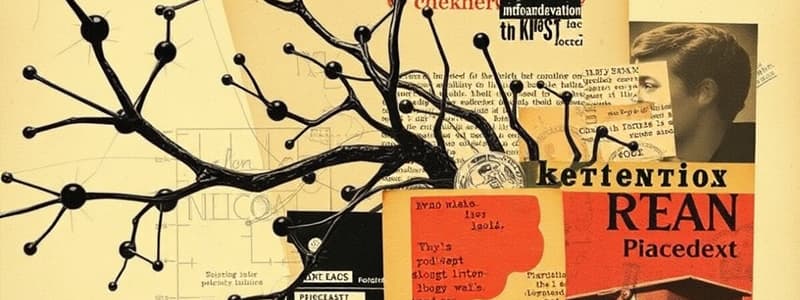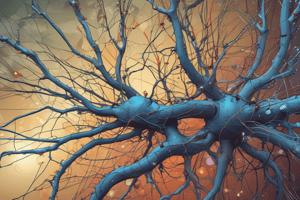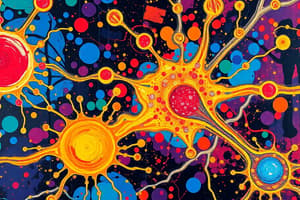Podcast
Questions and Answers
What is the primary role of acetylcholine (ACh) in the nervous system?
What is the primary role of acetylcholine (ACh) in the nervous system?
- Only involved in the somatic muscles
- Inhibited by dopamine reuptake
- Involved in the autonomic nervous system and somatic muscles (correct)
- Primarily synthesized from serotonin
What effect does botulinum toxin have on neurotransmitter activity?
What effect does botulinum toxin have on neurotransmitter activity?
- Stimulates the degradation of dopamine
- Increases the synthesis of acetylcholine
- Enhances the breakdown of norepinephrine
- Blocks the release of acetylcholine (correct)
What processes are involved in the termination of neurotransmitter action at the synapse?
What processes are involved in the termination of neurotransmitter action at the synapse?
- A combination of reuptake, degradation, and diffusion (correct)
- Only reuptake into the presynaptic neuron
- Exclusively receptor recycling by postsynaptic neurons
- Degradation and diffusion of neurotransmitters
Which of the following neurotransmitters is classified as a biogenic amine?
Which of the following neurotransmitters is classified as a biogenic amine?
What role does acetylcholinesterase play in neurotransmission?
What role does acetylcholinesterase play in neurotransmission?
What mechanism allows ions to pass directly from one cell to another in an electrical synapse?
What mechanism allows ions to pass directly from one cell to another in an electrical synapse?
Which event triggers neurotransmitter release from the presynaptic neuron?
Which event triggers neurotransmitter release from the presynaptic neuron?
What type of postsynaptic potential occurs when a neuron's membrane potential becomes more positive?
What type of postsynaptic potential occurs when a neuron's membrane potential becomes more positive?
In spatial summation, what is characterized by signals converging from multiple sources?
In spatial summation, what is characterized by signals converging from multiple sources?
Which receptor type opens ion channels directly upon neurotransmitter binding?
Which receptor type opens ion channels directly upon neurotransmitter binding?
What is the primary function of acetylcholinesterase in neurotransmission?
What is the primary function of acetylcholinesterase in neurotransmission?
What does temporal summation refer to in the context of synaptic transmission?
What does temporal summation refer to in the context of synaptic transmission?
Which ion typically causes hyperpolarization during IPSPs?
Which ion typically causes hyperpolarization during IPSPs?
Flashcards are hidden until you start studying
Study Notes
Synapse Types
- Electrical Synapse: Utilizes gap junctions for direct ion passage between cells, producing rapid responses.
- Chemical Synapse: Releases neurotransmitters from presynaptic to postsynaptic neurons, which is the main focus.
Chemical Synapse Functioning
- An action potential reaches the presynaptic axon terminal, leading to depolarization.
- Depolarization opens voltage-gated calcium channels, allowing calcium influx into the presynaptic neuron.
- Calcium enables vesicles containing neurotransmitters to fuse with the presynaptic membrane via the SNARE complex.
- Neurotransmitters are released into the synaptic cleft through exocytosis and bind to postsynaptic receptors.
Types of Receptors
- Ionotropic Receptors: These are ion channels that open upon neurotransmitter binding, changing the cell's membrane potential.
- Metabotropic Receptors: G-protein-coupled receptors that activate internal signaling pathways, indirectly triggering ion channel openings.
Postsynaptic Potentials
- Excitatory Postsynaptic Potentials (EPSPs): Membrane potential becomes positive (depolarization), bringing the neuron closer to firing an action potential (e.g., sodium channels opening).
- Inhibitory Postsynaptic Potentials (IPSPs): Membrane potential becomes negative (hyperpolarization), moving the neuron further from the threshold (e.g., potassium channels opening).
Summation Types
- Temporal Summation: Rapid succession of action potentials from one presynaptic neuron accumulates neurotransmitter levels, potentially triggering an action potential in the postsynaptic neuron.
- Spatial Summation: Convergence of signals from multiple presynaptic neurons onto a single postsynaptic neuron, determining if it reaches the threshold to fire.
Neurotransmitter Clearance Mechanisms
- Enzymatic Breakdown: Neurotransmitters, like acetylcholine, are degraded by enzymes (e.g., acetylcholinesterase) to stop their effects.
- Reuptake: Neurotransmitters are reabsorbed into the presynaptic neuron for reuse.
- Diffusion: Some neurotransmitters may naturally diffuse away from the synaptic cleft.
Key Neurotransmitters
- Acetylcholine (ACh): Key in both autonomous and somatic muscle functions; degraded by acetylcholinesterase, with choline recycled. Certain drugs can inhibit ACh release or its breakdown, prolonging effects.
- Biogenic Amines: Include neurotransmitters such as dopamine, epinephrine, and norepinephrine, synthesized from tyrosine. Norepinephrine plays a role in the autonomic nervous system and acts on postsynaptic receptors.
Importance of Mechanisms
- Understanding neurotransmitter release, effects on postsynaptic cells, and termination of actions is crucial for grasping neuronal communication.
- These processes are essential for exploring how drugs and diseases can impact synaptic transmission.
Studying That Suits You
Use AI to generate personalized quizzes and flashcards to suit your learning preferences.




